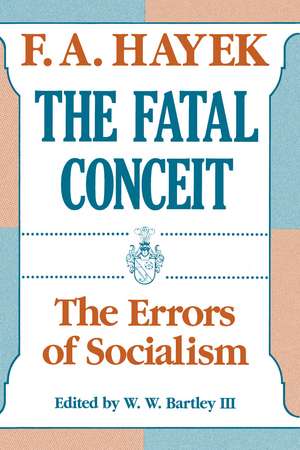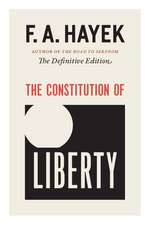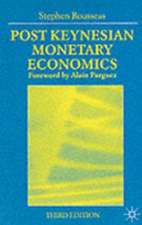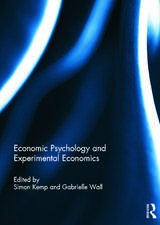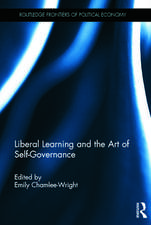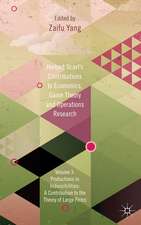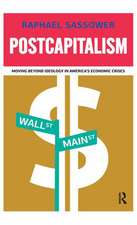The Fatal Conceit: The Errors of Socialism: The Collected Works of F. A. Hayek, cartea 1
Autor F.A. Hayek Editat de W. W. Bartley, IIIen Limba Engleză Paperback – 28 aug 1991
Hayek
gives
the
main
arguments
for
the
free-market
case
and
presents
his
manifesto
on
the
"errors
of
socialism."
Hayek
argues
that
socialism
has,
from
its
origins,
been
mistaken
on
factual,
and
even
on
logical,
grounds
and
that
its
repeated
failures
in
the
many
different
practical
applications
of
socialist
ideas
that
this
century
has
witnessed
were
the
direct
outcome
of
these
errors.
He
labels
as
the
"fatal
conceit"
the
idea
that
"man
is
able
to
shape
the
world
around
him
according
to
his
wishes."
"The achievement ofThe Fatal Conceitis that it freshly shows why socialism must be refuted rather than merely dismissed—then refutes it again."—David R. Henderson,Fortune.
"Fascinating. . . . The energy and precision with which Mr. Hayek sweeps away his opposition is impressive."—Edward H. Crane,Wall Street Journal
F. A. Hayek is considered a pioneer in monetary theory, the preeminent proponent of the libertarian philosophy, and the ideological mentor of the Reagan and Thatcher "revolutions."
"The achievement ofThe Fatal Conceitis that it freshly shows why socialism must be refuted rather than merely dismissed—then refutes it again."—David R. Henderson,Fortune.
"Fascinating. . . . The energy and precision with which Mr. Hayek sweeps away his opposition is impressive."—Edward H. Crane,Wall Street Journal
F. A. Hayek is considered a pioneer in monetary theory, the preeminent proponent of the libertarian philosophy, and the ideological mentor of the Reagan and Thatcher "revolutions."
| Toate formatele și edițiile | Preț | Express |
|---|---|---|
| Paperback (2) | 116.72 lei 22-36 zile | |
| University of Chicago Press – 28 aug 1991 | 116.72 lei 22-36 zile | |
| Routledge – 28 feb 1990 | 625.67 lei 22-36 zile | +13.81 lei 6-12 zile |
Preț: 116.72 lei
Nou
Puncte Express: 175
Preț estimativ în valută:
22.34€ • 24.28$ • 18.78£
22.34€ • 24.28$ • 18.78£
Carte disponibilă
Livrare economică 31 martie-14 aprilie
Preluare comenzi: 021 569.72.76
Specificații
ISBN-13: 9780226320663
ISBN-10: 0226320669
Pagini: 194
Dimensiuni: 152 x 229 x 20 mm
Greutate: 0.27 kg
Ediția:1
Editura: University of Chicago Press
Colecția University of Chicago Press
Seria The Collected Works of F. A. Hayek
ISBN-10: 0226320669
Pagini: 194
Dimensiuni: 152 x 229 x 20 mm
Greutate: 0.27 kg
Ediția:1
Editura: University of Chicago Press
Colecția University of Chicago Press
Seria The Collected Works of F. A. Hayek
Notă biografică
F. A. Hayek (1899-1992), recipient of the Medal of Freedom in 1991 and co-winner of the Nobel Memorial Prize in Economics in 1974, was a pioneer in monetary theory and a leading proponent of classical liberalism in the twentieth century. He taught at the University of London, the University of Chicago, and the University of Freiburg.
Cuprins
Editorial Foreword
Preface
Introduction: Was Socialism a Mistake?
1. Between Instinct and Reason
2. The Origins of Liberty, Property and Justice
3. The Evolution of the Market: Trade and Civilisation
4. The Revolt of Instinct and Reason
5. The Fatal Conceit
6. The Mysterious World of Trade and Money
7. Our Poisoned Language
8. The Extended Order and Population Growth
9. Religion and the Guardians of Tradition
Appendices
Editor's Acknowledgements
Bibliography
Name Index
Subject Index
Preface
Introduction: Was Socialism a Mistake?
1. Between Instinct and Reason
2. The Origins of Liberty, Property and Justice
3. The Evolution of the Market: Trade and Civilisation
4. The Revolt of Instinct and Reason
5. The Fatal Conceit
6. The Mysterious World of Trade and Money
7. Our Poisoned Language
8. The Extended Order and Population Growth
9. Religion and the Guardians of Tradition
Appendices
Editor's Acknowledgements
Bibliography
Name Index
Subject Index
Descriere
Hayek gives the main arguments for the free-market case and presents his manifesto on the "errors of socialism." Hayek argues that socialism has, from its origins, been mistaken on factual, and even on logical, grounds and that its repeated failures in the many different practical applications of socialist ideas that this century has witnessed were the direct outcome of these errors. He labels as the "fatal conceit" the idea that "man is able to shape the world around him according to his wishes."
"The achievement of The Fatal Conceit is that it freshly shows why socialism must be refuted rather than merely dismissed—then refutes it again."—David R. Henderson, Fortune.
"Fascinating. . . . The energy and precision with which Mr. Hayek sweeps away his opposition is impressive."—Edward H. Crane, Wall Street Journal
F. A. Hayek is considered a pioneer in monetary theory, the preeminent proponent of the libertarian philosophy, and the ideological mentor of the Reagan and Thatcher "revolutions."
"The achievement of The Fatal Conceit is that it freshly shows why socialism must be refuted rather than merely dismissed—then refutes it again."—David R. Henderson, Fortune.
"Fascinating. . . . The energy and precision with which Mr. Hayek sweeps away his opposition is impressive."—Edward H. Crane, Wall Street Journal
F. A. Hayek is considered a pioneer in monetary theory, the preeminent proponent of the libertarian philosophy, and the ideological mentor of the Reagan and Thatcher "revolutions."
